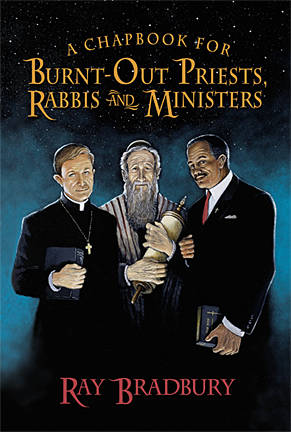Book Recommendations
Spotlight on: A Chapbook for Burnt-Out Priests, Rabbis, and Ministers by Ray Bradbury
 Ray Bradbury,
A Chapbook for Burnt-Out Priests, Rabbis, and Ministers
Ray Bradbury,
A Chapbook for Burnt-Out Priests, Rabbis, and Ministers
This is not a book for the average Ray Bradbury fan; there are no stories about Martians or dinosaurs or murderous babies. A Chapbook for Burnt-Out Priests, Rabbis, and Ministers is a collection of poems, essays, and musings on various literary, philosophical, and religious subjects and includes appearances from Albert Einstein, William Shakespeare, George Bernard Shaw, Gerard Manley Hopkins, H.G. Wells, Garry Kasparov, Death, God, Jesus, Homer, Noah, Ahab, and the Great and Powerful Wizard of Oz. It is the author's way of giving further mill grist to those who have inspired him, and who have taken inspiration from his works, by collecting all of these pieces in one place for quick reference on those off-weeks.
Understandably, the author's religion plays a noticeable role in most of the collected pieces. With Bradbury, however, it never tends towards proselytizing, merely existing as much as anyone's core beliefs seep into their writings. God pops up quite often, but always in interesting contexts: as compared to a chimney sweep, or saying "pass the chicken," for example. Also understandably, space, too, crops up -- often almost as much as religion and surprisingly often in the same work. "Christ on Improbable Planets" looks at religion's possible future relationship to space travel -- primarily in how the author has questioned it in his own works, and "Christus Apollo: A Cantata Celebrating the Eighth Day of Creation and the Promise of the Ninth" cries out to be put to music. Also included are his script pages of the ending to King of Kings that he was asked to write, but that proved too expensive to film. He laments this, saying that the Gospel of John -- which inspired his take -- has not yet been used for the ending of a film about Jesus.
The majority of the Chapbook consists of Bradbury's poetry, which is often heavy-handed. His ideas are interesting (God cannot exist without man, maggot bites inspire creativity), but his execution lacks subtlety; he tries for inspiration but evokes a chuckle. (One ties the great characters of Shakespeare to the assembly building at Cape Canaveral and another compares Moby Dick to Noah's Ark.) More interesting is his choice of form, which seems to be picked or invented for each offering. Ones that appear to rhyme on first look succeed at this with difficulty, meanwhile others that appear to be free verse contain a more natural internal rhyme or rhythm. Throughout all of this, though, his joyous spirit remains infectious. His love of poetry is also noticeable in the rhythm and beauty of his prose, but the most telling is his exhortation to other writers to read more of the stuff.
The prose offerings included in A Chapbook for Burnt-Out Priests, Rabbis, and Ministers include "Goodbye Means God Be with You," a touching fictional meditation on death and family. In "Refurbishing the Tin Woodman" -- within a treatise on the state of science fiction -- he calls Singing in the Rain a "science-fiction musical" based on its plot revolving around society's response to a new invention: the talking picture. Just like any other new advancement, this required an almost complete rethinking of the film industry, which is beautifully -- and humorously -- represented. Bradbury believes that George Bernard Shaw, having seen the first half of the film, would have come up with the second half on his own. It is just this kind of imaginative thinking that has seen the master's work endure through one century -- even chronologically past his own ideas of the "distant future" -- into the next and this Chapbook is a look at the other side of the man who has brought so many of us such indescribable pleasure.
This review originally appeared in somewhat different form on The Green Man Review. Copyright 2004. Reprinted with permission.
(Email me and let me know what you think.)
 |
This Readers Ring site is owned by Craig Clarke Want to join the ring? Get the info here The Readers Ring Page |
| [Prev 5] [Prev] [Next] [Next 5] [Random] [List Sites] | |